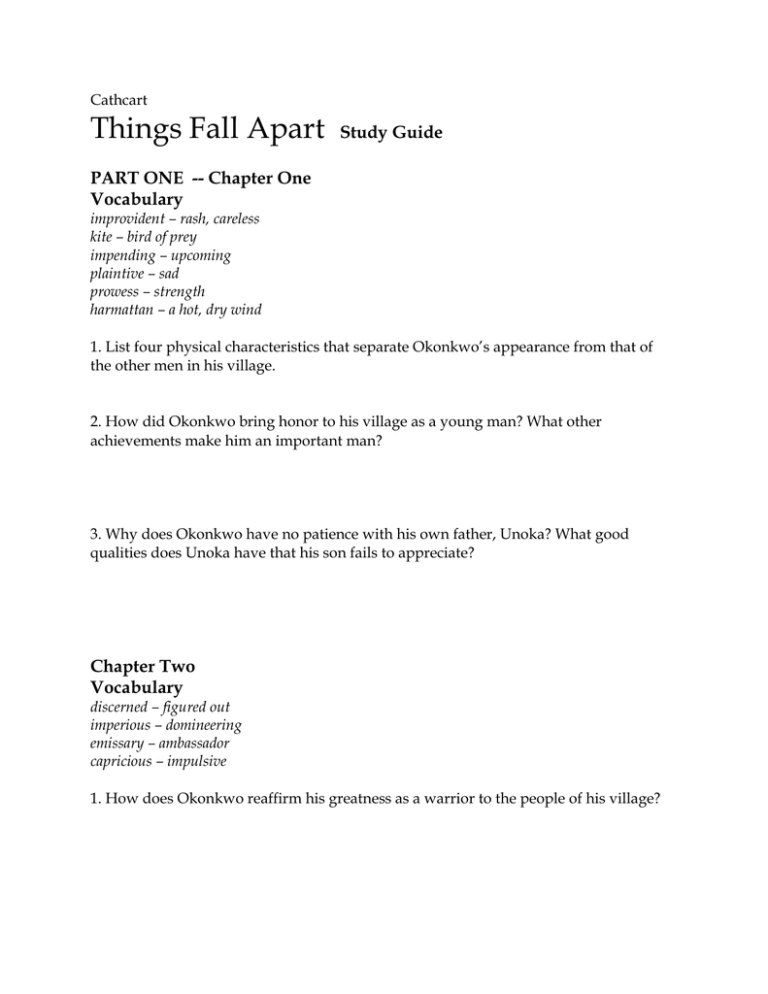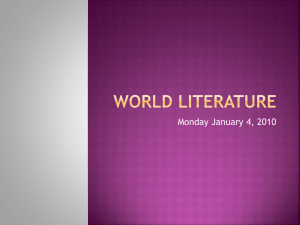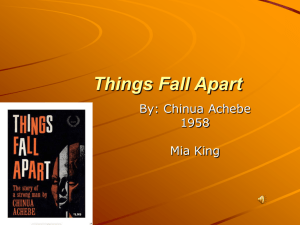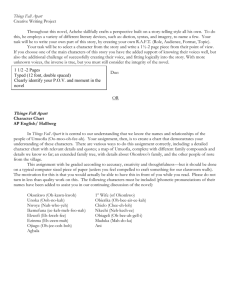Things Fall Apart Study Guide
advertisement

Cathcart Things Fall Apart Study Guide PART ONE -- Chapter One Vocabulary improvident – rash, careless kite – bird of prey impending – upcoming plaintive – sad prowess – strength harmattan – a hot, dry wind 1. List four physical characteristics that separate Okonkwo’s appearance from that of the other men in his village. 2. How did Okonkwo bring honor to his village as a young man? What other achievements make him an important man? 3. Why does Okonkwo have no patience with his own father, Unoka? What good qualities does Unoka have that his son fails to appreciate? Chapter Two Vocabulary discerned – figured out imperious – domineering emissary – ambassador capricious – impulsive 1. How does Okonkwo reaffirm his greatness as a warrior to the people of his village? 2. What is the “normal course of action” when a member of a neighboring clan murders one of the Ibo? 3. How does the Oracle of the Hills and the Caves prevent the powerful Umuofia from going to war with their neighbors? 4. Why does Okonkwo behave as a cruel man when, “perhaps down in his heart Okonkwo is not a cruel man”? (Pg. 13) 5. What does the reader know about Ikemefuna’s fate by the end of the second chapter? What literary term is employed? Chapter Three Vocabulary tendrils – threads contemptible – horrible dregs – the worst parts malicious – evil 1. Describe the entrance to the shrine called Agbala. How does a worshipper get a message from the gods? What is a chi? 2. What proverb does Okonkwo use to compliment Nwakibie? 3. Describe the custom of wine sharing presented in this chapter. 5. State a general theme for this story using the piece of wisdom about failure that Unoka offers his son. Why does Okonkwo not listen to his father’s words? 6. List the crops that the women are responsible for in the Ibo clan. Chapter Four Vocabulary brusqueness – rudeness benevolent – kind plait – hair braid repentant – sorry valediction – leaving deftly – – skillfully arduous – difficult poignant – moving or touching 1. Comment on the general truth Okonkwo learns from the following Ibo proverb: “When a man says yes his chi says yes also. Okonkwo said yes very strongly; so his chi agreed.” (Pg. 27) 2. What are Ikemefuna’s special skills that make him popular with Nwoye? 3. What is the importance of the Week of Peace to the Ibo clan? In the past, how did the clan punish a man for breaking the peace? What is Okonkwo’s punishment? 4. What sentence in this chapter indicates that Nyoye’s life is greatly influenced by Ikemefuna’s presence in their household? Chapter Five Vocabulary reveled – celebrated tentative – not fully worked out pottage – soup or stew calabashes – gourds 1. Why is Ani the most important deity in the lives of the Ibo people? What is the New Yam Festival? 2. What story is always told at the New Yam Festival? 3. In what ways do you think Okonkwo’s second wife both respects and dislikes her husband? 4. What is the purpose of the drums beating the day of the New Yam Festival? What might these drums symbolize? 5. What does Okonkwo say to criticize his daughter Ezinma, even though he really is fond of her? Why do you think he is so harsh? Chapter Six Vocabulary grandees – rulers taut – tight disembodied – without a body fronds – leaves of plants like ferns and palm trees prophesied – predicted the future 1. How do the drums reflect the emotions of the crowds at the wrestling match? 2. Why do you think Ezinma’s mother says to the priestess “Perhaps she has come to stay”? (Pg. 48) 3. Prove the following statement with incidents from the story: Physical strength is greatly admired by the Ibo people. Chapter Seven Vocabulary feign – fake rebuked – scolded harbinger – omen of the future copiously – a great deal of amiss – wrong tendril – thin, new growth on a plant wily – clever, sneaky espied – saw 1. How is Nwoye changed after Ikemefuna’s arrival? 2. Why do you think Nwoye’s mother tells the story about the Earth and the Sky? Why is this story considered a myth? What is Nwoye’s dilemma? 3. What advice does Ezeudu give to Okonkwo regarding Ikemefuna’s death? 4. Why does Okonkwo kill Ikemefuna? How does this action also destroy his relationship with his son Nwoye? 5. Find a metaphor in this chapter. Chapter Eight Vocabulary coiffure – hairdo snuff – tobacco succulent – full and firm 1. How does Okonkwo feel about his role in Ikemefuna’s death? 2. What do we learn about the role of women in the Ibo society by the death of Ogbuefi Ndulue? 3. Why is Obierika sometimes sorry he has the title of ozo? 4. What general truth is found in the following proverb? “When mother-cow is chewing grass its young ones watch its mouth.” (Pgs. 70-71) 5. How is Akueke’s bride price settled? Find a proverb explaining the negotiating process. 6. What do the Ibo people think about white men in general? What other evidence has there been in the story proving the existence of white men in Nigeria? Chapter Nine Vocabulary specious – false agility – skill devoid – minus or empty manifest – made clear audacity - boldness wont – accustomed 1. What is an ogbanje? How does Okonkwo deal with it? What does the medicine man do to ensure Ezinma does not return to the spirit world? 2. In what ways does Ekwefi think her chi rules her life? 3. What lesson is taught by the fable about the snake lizard and his mother? 4. What evidence is there that male children are important to Ibo women? Chapter Ten Vocabulary communal – in a community pandemonium – uproar, confusion quavering – shaking esoteric – only known by a few; confidential approbation – criticism faggots – sticks trifle – small amount 1. Who are the egwugwu? Why are there nine of them? 2. Why don’t the women ever see the inside of the eqwugwu’s hut? 3. What is the decision of the egwugwu in the case of Uzowulu and his runaway wife? 4. Support or refute the following statement: It is not a crime for a man to beat his wife in this society. Chapter Eleven Vocabulary impenetrably – cannot be entered forsook – left, abandoned lest – unless incipient – beginning to exist orator – speaker plumage – a bird’s feathers luxuriant – thick, heavy vegetation 1. What is the moral lesson taught by the fable of the tortoise? 2. Support or refute the following statement: Ekwefi is very brave to follow Chielo after the priestess takes Ezinma from her home in the middle of the night. 3. Why do you think Okonkwo comes to the shrine? How does Ekwefi feel about his presence there? Chapter Twelve Vocabulary tethered – tied to prominent – noticeable; important 1. Find an example of a legend in this chapter. 2. Briefly describe how the Ibo women solve the problem of a cow trespassing in a neighbor’s crops. 3. List the steps the bride’s family follows for her uri ceremony. Chapter Thirteen Vocabulary lamentation – noise associated with grief raffia – plant material tumult – commotion; ruckus brand – torch brandishing – holding 1. Why do you think a “cold shiver ran down Okonkwo’s back as he remembered the last time the old man” Ezeudu visited him? (Pg. 121) 2. Briefly describe the funeral of the great warrior, Ezeudu. How does a warrior become one of the “lords” of the clan? 3. Why must Okonkwo leave the clan? 4. A tragic flaw is a defect of character which brings about the downfall of the protagonist. What do you think is Okonkwo’s tragic flaw? 5. What is ironic about the fact that Okonkwo’s crime is considered a “female” crime? 6. With what customs of the clan does Obierika not agree? 7. How does the following proverb explain the harsh punishment given to Okonkwo? “As the elders said, if one finger brought oil it soiled the others.” (Pg. 125) PART TWO -- Chapter Fourteen Vocabulary sisal – plant material like rattan mirthless – joyless 1. Why does Okonkwo sit in a “silent half-sleep”? (Pg. 131) 2. Briefly describe the final isa-ifi marriage ceremony. 3. Why is a woman brought back to her kinsmen to be buried? Chapter Fifteen Vocabulary ominous – threatening, menacing abomination – disgust; something horrible 1. Why does the Abame clan kill the white man? 2. What evidence is there in this chapter that the clans do not understand the white man’s way of life? 3. Support or refute the following statement: The white men do not want to know anything about the clan’s culture because they think it is inherently inferior and not worth learning about. 4. What moral lesson is taught by the fable of the mother kite and her daughter? 5. Find a proverb about a newly married man. Chapter Sixteen Vocabulary enthralled – spellbound callow – immature evangelists – Christian preachers benevolently – kindly 1. Why is Nwoye interested in the missionaries? 2. What is Okonkwo’s opinion of the white religion? Is there anything about the missionaries that the Ibo people like? 3. Why is it funny when the Ibo translator mistakes the word for “myself?”(144). 4. What do the missionaries say about the tribal gods and how does it affect the villagers? Chapter Seventeen Vocabulary fetishes – objects of worship miscreant – villain; evildoer effeminate – behaving like a woman impotent – lacking power 1. Why do the Mbanta people begin to believe the white man’s religion has great power? How long do they wait for the Evil Forest to do its work? 2. How does the Ibo superstition about the birth of twins compel the first native woman to join the white man’s church? 3. How does Okonkwo react when he is told his son is attending the white man’s church? 4. Why is Okonkwo terrified that his other children will join Nwoye in the white man’s church? 5. What name does Okonkwo’s clan call him? How does this name help him to understand how he, a strong man, could father such a weak son? Chapter Eighteen Vocabulary caste – group in society wavering – shaking adherents – believers atonement – amends blasphemous – sacrilegious ostracize – to exile derision – mockery, disrespect 1. Who are the osu? How do they cause trouble for the new white church? 2. Who triggers a new conflict between the clan and the white church? What does Okonkwo want to do to solve it? What does he think of the clan’s final solution? 3. Why does the clan ultimately relent on their sanctions against the members of the white church? Chapter Nineteen Vocabulary tuber – edible root wherewithal – ability 1. Find a proverb in this chapter explaining why men are superior to animals. 2. In Okonkwo’s mind, how does Mbanta compare to Umuofia? 3. What overall message or theme for this story is stated at the end of this chapter by one of the elders in the clan? PART THREE Chapter Twenty Vocabulary irreparable – cannot be repaired resilient – flexible arrogant – a feeling of superiority 1. In what ways does Ezinma demonstrate her loyalty to her father? 2. How has the church strengthened its position in Umuofia during Okonkwo’s absence? 3. Who are the kotma? Why are they corrupt? 4. When Okonkwo returns home he wants to stand against the white man and force him out of the community. Obierika says it is too late because, “He has put a knife on the things that held us together and we have fallen apart.” (Pg. 176) What has fallen apart, and why does Obierika think it is useless to fight the white men? 5. What was the attitude of the white men who came to Umuofia regarding the language and culture of the people? Chapter Twenty-One Vocabulary dispensation – exemption akin – similar to expedient – the means to an end singlets – undershirts zeal - enthusiasm 1. How is Mr. Brown different from the white missionary in Okonkwo’s motherland? What does he do to encourage the clan to send their children to his school? 2. The God Chukwu is identified in this chapter. In what way is he similar to Mr. Brown’s God? Why does Mr. Brown object to the way the people worship their god? 3. Why is Okonkwo’s return home not as successful as he had hoped? Chapter Twenty-Two Vocabulary idolatrous – excessive devotion clamoring – making loud noises amulet – a charm wan – pale guttural – from the throat 1. In what way is Mr. Smith responsible for Enoch’s crime of unmasking an egwugwu? 2. What does Mr. Smith wisely do to avoid being killed? 3. Support the following statement: The act of burning the white church is “too little, too late” to save the tribe from destruction. Chapter Twenty-Three Vocabulary palaver – talk sullen – sad, gloomy sonorous – deep sound 1. How does the District Commissioner violate the rights of the leaders of Umuofia, even under white man’s law? How is this an example of irony? 2. What indignities are the prisoners subjected to by their jailers? 3. Why does the village decide to pay the fine for the men? Chapter Twenty-Four 1. What does Okonkwo plan to do if the clan decides not to go to war with the whites? 2. Why does Okonkwo kill the messenger? 3. How does Okonkwo know the clan will not decide to go to war? Chapter Twenty-Five Vocabulary infuriating – irritating superfluous – unnecessary resolute – strong willed desecrated – ruined enthralled – spellbound callow – immature 1. In what way is it ironic that Obierika and the other clan members will not touch Okonkwo’s body? 2. To what extent may Okonkwo’s death be viewed as a tragedy? 3. What is the tragedy of the Ibo people which is implicit in the last paragraph? 4. Where is Okonkwo’s suicide foreshadowed earlier in the novel?





